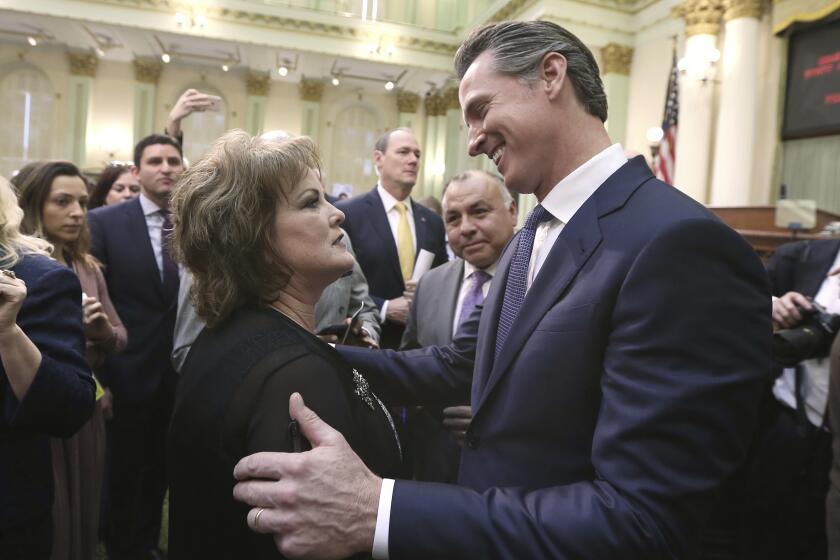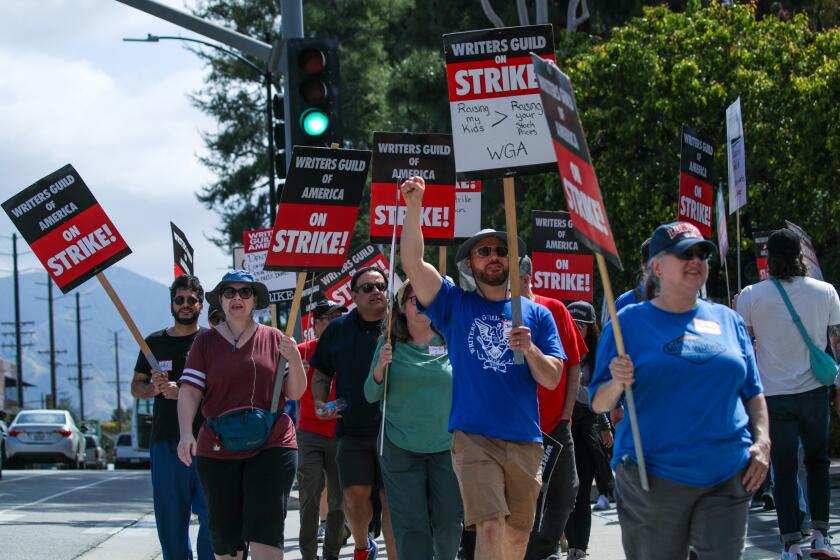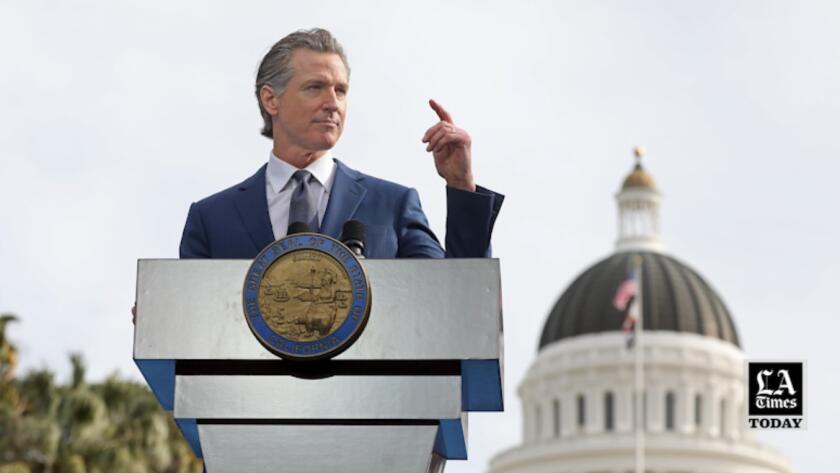News Analysis: With actions on drug laws, mental health and labor, Newsom moves toward center in second term
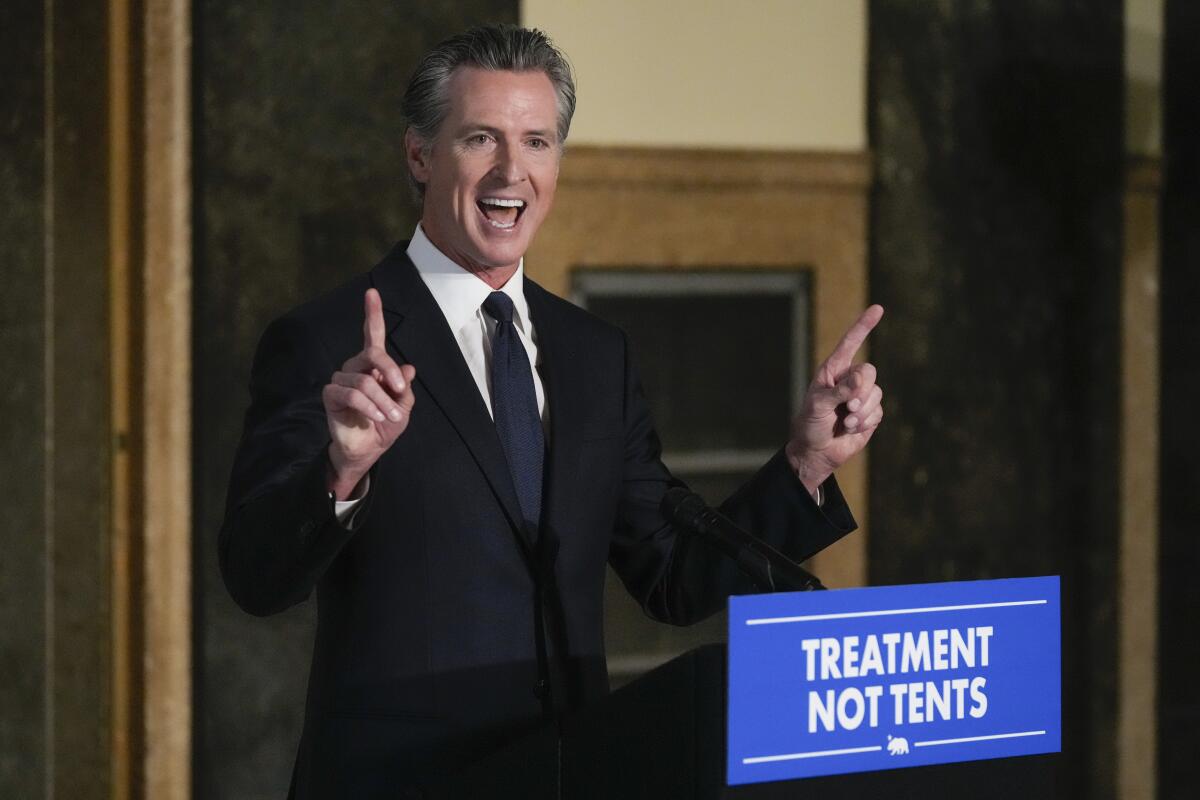
- Share via
SACRAMENTO — When Gov. Gavin Newsom put down his veto pen Friday night, closing the book on his fifth year of making laws for California, what emerged were signs that in his second term leading the state, the liberal Democrat from San Francisco is drifting toward the political center.
He vetoed bills to decriminalize psychedelic drugs and allow Amsterdam-style cafes for smoking pot. He bucked powerful labor unions in rejecting a bill that would have allowed workers to receive unemployment benefits when they strike.
He repealed two laws that were initially championed by the left but proved ineffective — a ban on government travel to states with anti-LGBTQ policies and a law punishing doctors who spread COVID misinformation.
And he threw his weight behind legislation to overhaul the mental health care system and increase criminal penalties for child sex trafficking that had significant support from Republicans — and put him at odds with many of his progressive allies. In signing the trafficking bill, Newsom faced criticism for enacting the first expansion in years of California’s “three strikes” law that criminal justice reform groups blame for filling prisons.
Newsom’s move toward centrism this year was more of a step than a leap, to be certain. He still signed about 85% of the roughly 1,000 bills the Democratic Legislature sent him and embraced progressive first-in-the-nation measures that will raise wages for workers in the fast-food and healthcare sectors and attempt to curb climate change by requiring large companies to publicly disclose their greenhouse gas emissions. GOP presidential hopefuls still attack Newsom as a liberal bogeyman, and his relationship with California Republicans remains frosty.
But Newsom is acutely aware that he’ll be termed out of California’s top office in three years, frequently referring to himself as a “future ex-governor.” The totality of his actions this year could help him refute a perception that he’s a wacky liberal from California in a future pitch to voters across the nation.
“If you’re in a national campaign, you need to be able to tout your moderate bona fides,” said Gar Culbert, a professor of political science at Cal State Los Angeles.
“The people who are going to paint you with whichever sort of extremist brush that they want to paint you with, they’re going to be able to do that. ... The question is whether or not you can tell the narrative you want to.”
California lawmakers sent Gov. Gavin Newsom a controversial bill Wednesday to increase penalties for child sex traffickers.
Newsom emerged from two terms as San Francisco’s mayor in 2011 with a record as a moderate by the standards of the ultra-liberal city. An entrepreneur in the wine and hospitality business before he entered politics, Newsom was steeped in the city’s elite power structure. Then, when he ran for governor in 2018, he positioned himself to the left of his main Democratic rival, former Los Angeles Mayor Antonio Villaraigosa. Newsom trounced Villaraigosa in the primary and sailed to victory with strong support from organized labor.
He established himself as a liberal in his first term as governor, placing a moratorium on the death penalty, enacting universal preschool, making plans to close two prisons and pushing to phase out new gas-powered cars by 2035. He beat back an attempted recall and emerged with a defiant air.
This year, Newsom elevated his national political profile by launching a campaign to help Democrats in Republican-led states and picking an incessant fight with GOP Florida Gov. Ron DeSantis, who is running for president. If Newsom decides to run for president in the future, showing some moderation in his second term will probably be a benefit.
It builds his credibility as a leader and shows that he’s not just pandering to the left wing of the party, Democratic strategist Bill Wong said.
“There’s a concern, that a lot of people won’t talk about, that the party is getting further and further out of touch with the rest of the public,” Wong said.
Dan Newman, a longtime political aide to Newsom, said political considerations are often part of decisions made by elected officials. But he contended that Newsom and his staff prioritize supporting good policy.
“Too often the news analyses focused on five-dimensional political chess unfairly diminish the central role of policy staff helping the governor make decisions that align with his long and consistent history as a bold, pragmatic, fiscally responsible progressive,” Newman said.
Still, the governor’s vetoes showed that he’s acting as a moderating force on the liberal Legislature. One reason is simply that the Legislature was unusually progressive this year, passing significant labor-backed bills that had failed in the past. Another is that the state’s finances are shakier.
The recent run of wins in the Legislature for organized labor was remarkable. Now Gov. Newsom must decide if union-backed bills will become law.
The governor vetoed dozens of bills using the same boilerplate paragraph that argued he won’t approve spending outside of the annual state budget.
“We enacted a budget that closed a shortfall of more than $30 billion through balanced solutions,” Newsom wrote. “This year, however, the Legislature sent me bills outside of this budget process that, if all enacted, would add nearly $19 billion of unaccounted costs in the budget.”
This was the argument Newsom made in vetoing legislation to require independent redistricting in Los Angeles, as well as numerous other measures. Among them: proposals to require high schools to provide free condoms for students, develop housing for homeless LGBTQ+ youth and expand the availability of free diapers to low-income families.
Though Newsom signed many labor-backed measures, including a law that will allow legislative staff to form unions, he also rejected some labor priorities with vetoes that show he understands the challenges of a business owner.
In vetoing a bill that would have allowed workers to receive unemployment benefits when they strike, Newsom wrote that doing so would increase the debt California owes the federal government for unemployment payments and could “significantly [increase] taxes on employers.”
His veto of a bill that would have given workplace safety protections to nannies and housekeepers argued that “private households and families cannot be regulated in the exact same manner as traditional businesses.” In particular, Newsom called out workplace regulations that require “providing an eyewash station if household workers use chemicals like bleach.”
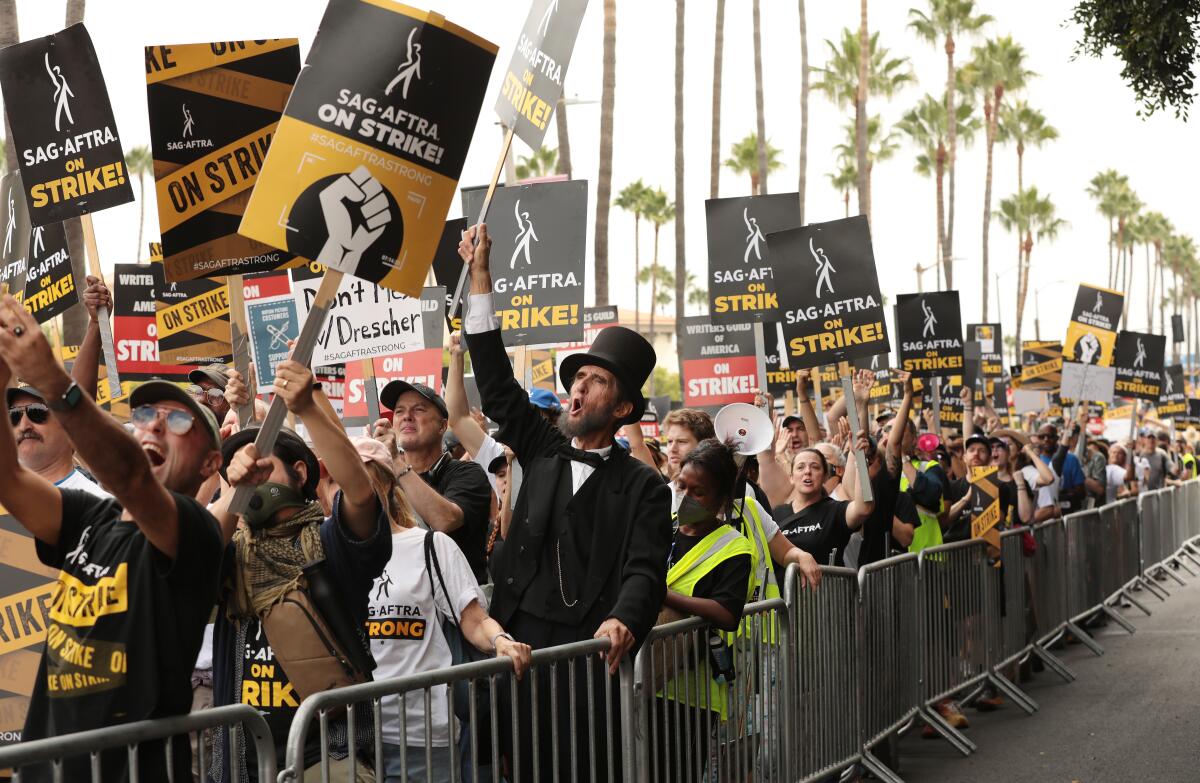
Similarly, Newsom paddled left and right on legislation affecting Silicon Valley. He signed a bill into law that will hold social media platforms liable for failing to combat the spread of child sexual abuse materials. But he put the kibosh on legislation that sought to give workers more power against Big Tech, vetoing a bill that would have required human drivers in autonomous trucks and another that responded to massive job losses in the tech industry by increasing the notice period companies must give workers of impending layoffs.
“I think that Newsom, even dating back to San Francisco, has always been generally pro-worker, especially the lowest-wage workers, and wants to lift up people who are living in poverty and I think he continues to do that,” said Lorena Gonzalez Fletcher, who leads the California Labor Federation.
But she said there’s a difference between helping people at the bottom of the economic scale, by signing bills to increase paid sick leave and raise the minimum wage for restaurant workers to $20 an hour, for example, and supporting policies that give them more rights in the workplace.
“He’s giving things to workers and that’s good. We’ll always support that, but there are fewer instances where he’s supporting workers who are empowering themselves,” Gonzalez Fletcher said.
Other vetoes rejected identity politics embraced by most Democratic legislators by arguing that existing laws are sufficient to address the issues. That was the case he made in vetoing a bill that would have made California the first state in the nation to ban discrimination on the basis of caste and a bill that would have made a child’s gender identity an issue in custody disputes between parents. In both cases, his veto messages reiterated his commitment to ensuring civil rights for all Californians but said the specific proposals were not necessary.
A debate over whether homeless people should be allowed to sleep in public has created strange bedfellows in California.
Newsom’s shift away from the left on issues of homelessness, mental health and substance abuse also was evident in the courts. Last month, he asked the conservative U.S. Supreme Court to review court rulings that have restricted local authorities from clearing encampments. It was an instance of strange political bedfellows as the Democratic governor aligned himself with conservative justices who had asked the high court for a similar review months earlier.
As a seasoned politician, however, Newsom knows his political future depends greatly on his success as governor. For Californians, that means seeing tangible improvement to the homelessness and housing affordability crises, which he has promised to deliver, not just filling the air with flowery speeches and signing fruitless new laws pushed by the left.
At an event in Los Angeles on Thursday, Newsom signed legislation that seeks to expand substance abuse services and generate nearly $6.4 billion to build facilities to provide thousands of new treatment beds.
The proposals, which will appear on the March 2024 ballot, received support from Democratic and Republican lawmakers at the state Capitol. The bipartisan support speaks to the pressure voters are placing on legislators across the state and the reality that Newsom’s chosen solution doesn’t adhere to strict party ideals.
Newsom said it’s clear that Californians are “a little exhausted” with watching politicians at lecterns talk about fixing the problem.
“Their frustration is palpable, it’s self-evident,” Newsom said. “But at the end of the day, they’re right to be frustrated because … we haven’t proven that we are capable of meeting their concerns and anxieties.”
Culbert, the political scientist, said Newsom’s centrist approach on homelessness and mental health makes sense because his legacy will depend more on outcomes than party politics.
“If you can improve in that area, and this has been an administration-long objective, now is the time,” Culbert said. “He doesn’t have much time left.”
- Share via
Watch L.A. Times Today at 7 p.m. on Spectrum News 1 on Channel 1 or live stream on the Spectrum News App. Palos Verdes Peninsula and Orange County viewers can watch on Cox Systems on channel 99.
More to Read
Sign up for Essential California
The most important California stories and recommendations in your inbox every morning.
You may occasionally receive promotional content from the Los Angeles Times.
